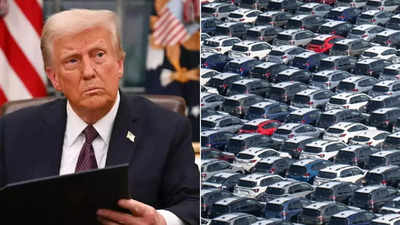US President Donald Trump on Wednesday announced a 25 per cent tariff on auto imports, a move the White House claims will boost domestic manufacturing but could significantly impact global automakers and trade relations. “This will continue to spur growth. We’ll effectively be charging a 25 per cent tariff,” Trump told reporters.
The tariffs, expected to generate $100 billion annually, will take effect on April 3. However, concerns are mounting over rising costs for automakers, potential job losses, and retaliatory measures from affected nations. Trump insists the move will lead to more factories in the US and reduce reliance on a “ridiculous” supply chain stretching across North America and beyond.
Japan: ‘Extremely regrettable’
Japan has strongly criticised the new tariffs, calling them “extremely regrettable.” Government spokesman Yoshimasa Hayashi voiced disappointment, while Prime Minister Shigeru Ishiba stated that Japan is considering “appropriate measures” in response.
Japan, the largest foreign investor in the US auto industry, fears significant repercussions. “Japan has made significant investments and significant job creation, which doesn’t apply to all countries,” Ishiba said.
Following the announcement, shares in Japanese automakers plunged, with Toyota dropping 3.5 per cent, Nissan 2.5 per cent, and Mazda nearly 6 per cent. The auto sector represents 10 per cent of Japan’s economy, making the tariffs a major concern.
European Union: ‘Deeply regrets’ tariffs
European Commission President Ursula von der Leyen condemned Trump’s move, warning that it could escalate trade tensions. “I deeply regret the US decision to impose tariffs on European automotive exports,” she said, adding that the EU will seek “negotiated solutions while safeguarding its economic interests.”
With Germany being one of the top auto exporters to the US, the new tariffs could significantly impact European automakers such as Volkswagen, BMW, and Mercedes-Benz.
Canada: ‘A direct attack’
Canadian Prime Minister Mark Carney called Trump’s tariffs “a direct attack” on Canada’s economy and workers. “We will defend our workers. We will defend our companies. We will defend our country,” he said.
Carney announced a $1.4 billion “strategic response fund” to support Canadian auto jobs and suggested retaliatory measures could follow. Autos are Canada’s second-largest export, employing over 600,000 people.
Ontario Premier Doug Ford warned of severe disruptions, stating, “Auto plants on both sides of the border will shut simultaneously if these tariffs proceed.”
Carney, who previously led the Bank of Canada, criticised Trump’s trade war, saying it was hurting American consumer confidence, which recently hit its lowest level since 2021.
UK: ‘A blow to US-UK relations’
The UK’s Society of Motor Manufacturers and Traders (SMMT) also criticised the tariffs, warning they would harm both British and American businesses. “This move is not surprising but, nevertheless, disappointing,” said SMMT chief executive Mike Hawes. “It is a blow to a long-standing and productive relationship.”
The Trump administration argues the tariffs will boost US manufacturing and reduce the trade deficit. However, experts warn they may lead to higher car prices, job losses, and economic retaliation from major trading partners. With automakers scrambling to assess the impact, global trade tensions are set to rise.




